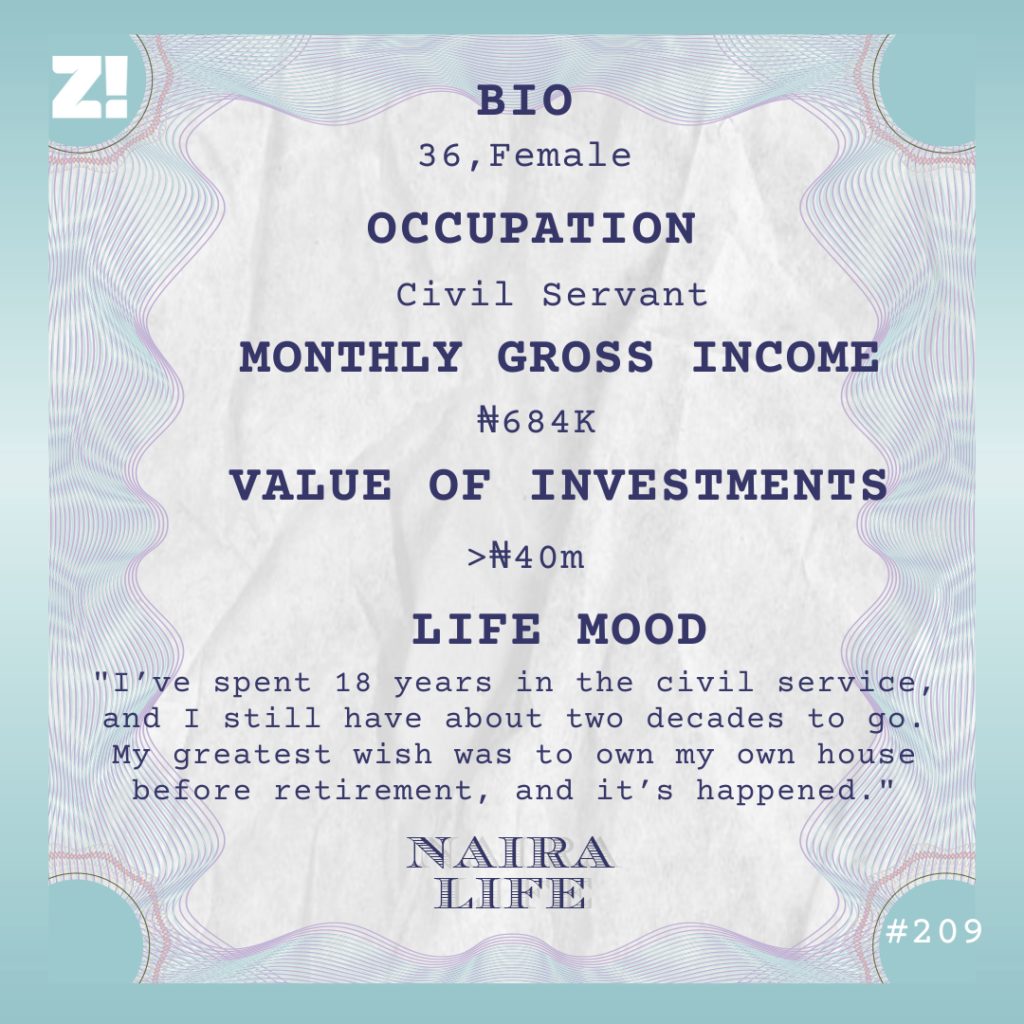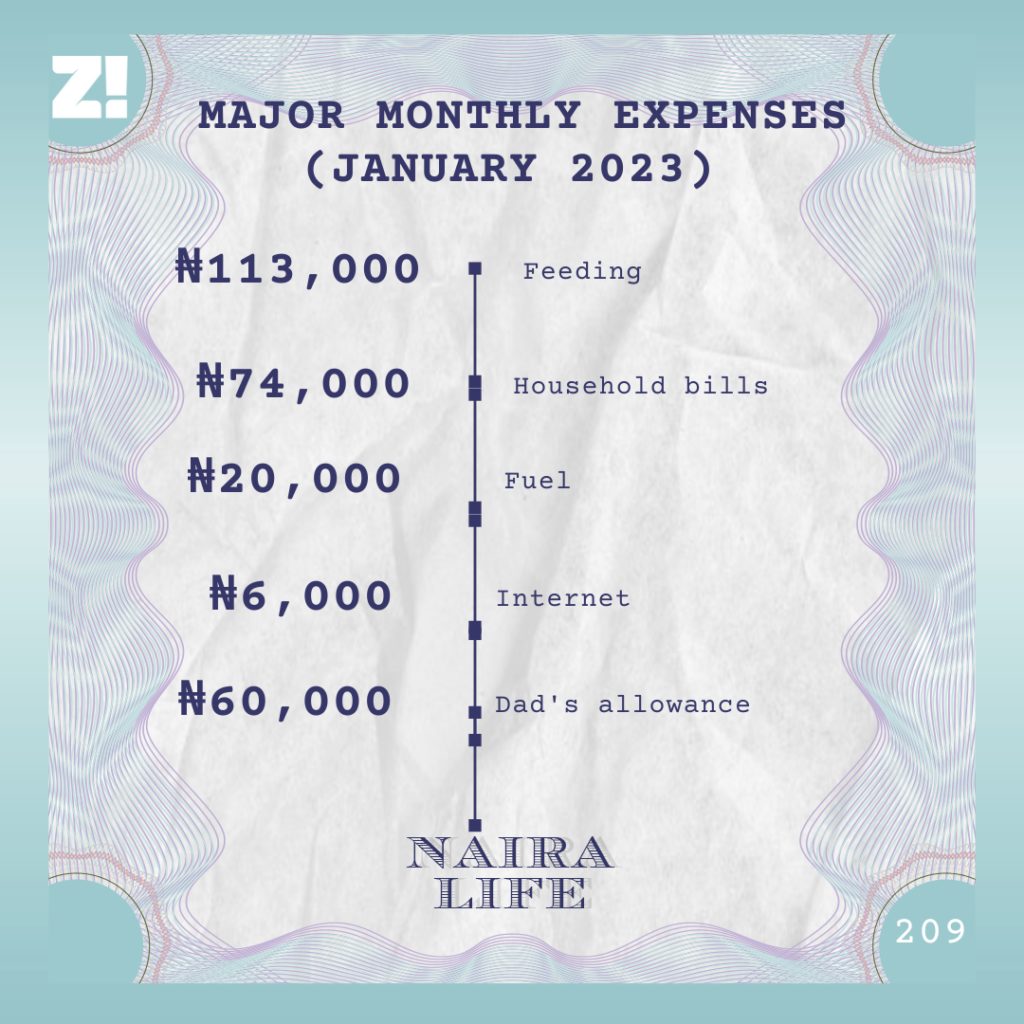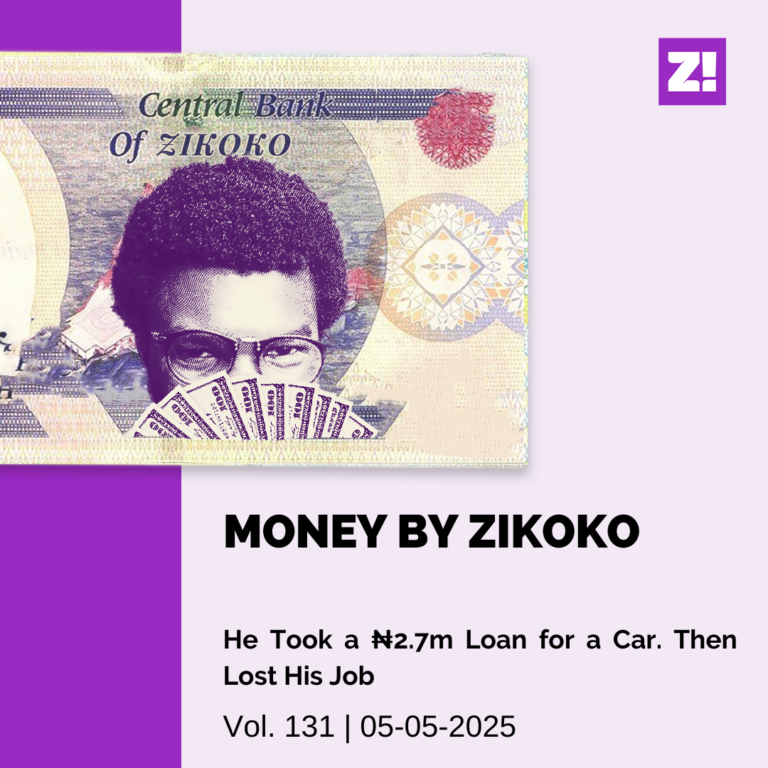Every week, Zikoko seeks to understand how people move the Naira in and out of their lives. Some stories will be struggle-ish, others will be bougie. All the time, it’ll be revealing.
The civil servant in this #Nairalife has worked for 18 years and her current gross salary is ₦684k. But she also owns real estate worth over ₦40m.
How did she do this while supporting a family? Years of little moments adding up, relationships and access to loans.

What’s the oldest memory of money you remember?
My first job comes to mind. While waiting for my WAEC results after secondary school, I took a job at a video club and the pay was ₦2500/month. This was in the early 2000s. This was significant because my mum told me to buy my dad a gift from my first salary. I bought him a pair of singlets.
What did your parents do for a living?
My dad was a bursar in a school. My mum worked with some shipping companies as a transporter – she was a middleman between the shipping companies and the owners of containers coming into the country. When the containers landed and got cleared, she liaised with truck companies and make sure the containers got to their final destinations. That’s how she earned her commission.
Although my mum earned more than my dad, they shared the financial responsibilities of the family. My dad bought foodstuff in bulk and my mum took care of everyday groceries. Whenever my dad couldn’t pay our school fees, my mum did. Their partnership worked.
Also, My dad had been married and divorced before he got with my mum. I’m the first of my mum’s four kids and the fifth of my dad’s eight kids. At some point, my half-siblings started living with us. My mum’s nephew also lived with us. We were a pretty big family.
What came after your first job?
School. At 16, I was admitted into a college for a National Diploma in Marine Engineering.
What does a marine engineer in Nigeria do?
The job is to work on marine vessels and design, develop and maintain the electrical and mechanical systems that power them.
Did you do that?
I did when I started working. But I tried other things in school first. I had a fridge, so I started selling sachets of pure water. I’d buy 10 bags for ₦500 and get one extra bag. One sachet sold for ₦5, and I typically made ₦600 in profit for every batch of 11 bags. I did this until I finished my ND programme in 2005.
HND next?
No. Industrial Training (I.T.). In April 2005, I got placement at a new oil company. The company was starting to import petroleum products and had just bought two vessels. I worked there as an administrative staff for a few months. The plan was to finish off my I.T. and go for my HND programme. That never happened.
Why?
A vacancy opened up in a federal ministry. I applied and got the job. In October 2005, I ditched the oil company and started working for the government.
I joined the civil service because of the Job security and other monetary benefits like pension and end-of-year allowances. I was placed on Grade Level 4, and my starting salary was ₦16,500.
Another great thing about the ministry where I worked was the all-expense paid training programmes out of Nigeria. About two months into the job, I was sent to South Africa for six months, and my salary was paid while I was away.
When I returned to Nigeria in 2006, I was balling. Thankfully, my mum had some sense and foresight and helped me put the money to good use.
How?
My parents bought some big pieces of land from the government and my mum thought it’d be great to buy a piece in my name. When I returned to Nigeria, she mentioned it and advised me to pay for it. It cost me about ₦120k.
You bought your first property at 19. Energy!
Now I was curious about tangible things I could do with money. The first step was to start saving a portion of my salary.
In 2006, I was working on tug boats as a trainee marine engineer. As a result of the federal government’s privatisation policy, the tug boat was being managed by a private company. We negotiated with the company to pay us a stipend, and they agreed to ₦16k/month. My government salary was also there, so my monthly earnings were ₦32,500. ₦10k went into my savings account every month.
By 2009, I had been promoted to Grade Level 8 and had returned to working with the government full-time, earning ₦100k.
From ₦16k?
Between 2006 and 2009, the federal government started the monetization policy and some benefits were added to my monthly salary. When this happened, I started saving ₦20k a month.
2009 was also the year I tried to buy my first house.
Oh? Tell me about that.
The state government put up some properties they were developing in an estate for sale. I applied to buy a 2-bedroom apartment, which was ₦5.5m. The plan was to pay the required down payment of 10% and spread the rest over a few years. It was like a mortgage plan.
After paying the down payment, I started saving ₦30k for the apartment, in addition to saving the routine ₦20k/month. It was easy to do this since I was still living with my parents.
In 2010, my dad retired and things changed a little – I stepped up at home and my mum convinced me to put my dad on a monthly allowance, so I started giving him ₦10k. I was also spending about ₦15k every month to buy food for the house. These were my major expenses until I got married.
When was that?
October 2010. My salary was almost twice what my husband made from his bank teller job. As a result, it quickly dawned on me that I’d pick up most of the bills. We rented a 2-bedroom apartment for ₦300k, paying for it with my leave allowance and end-of-year bonus and some money gifts from our families.
We moved into our apartment in January 2011.
How did getting married impact your finances?
My biggest worry was rent. The moment we moved in, I started putting ₦20k for rent. The plan was to augment whatever remained to make rent with my leave allowance and end-of-year bonus as those typically came in at the end of the year.
But the only thing on my mind was to finish paying off the mortgage, so my husband and I could move into our apartment.
Right. How was that going?
Between 2009 and 2011, I paid the government ₦1,650,000 for the apartment. But for some reason, they suddenly stopped receiving money. Ultimately, they revealed that the board in charge misappropriated funds meant for the project, and the houses never got completed. That’s how my money went.
When the government scams you, who do you report to?
Man, I’m sorry. That sucks.
2011 was a tough year. My mum also passed that year. But I also gave birth to my first child, so it wasn’t all bad.
On the work front, they introduced promotion exams, which were scheduled every three years. I was due to write one in 2011 – I did and passed and moved to Grade Level nine, increasing my salary to about ₦250k.
The timing was perfect because two of my younger siblings were still in school, and I had to take up their school fees after my mum passed. I had also enrolled in a part-time programme at the state university and was paying my tuition fees. In addition, I was still in charge of raising rent money rent for my family and saving for emergencies.
Did it ever feel like you were punching above your weight?
Sometimes, but it wasn’t bad. The next thing that happened at work was the unbearable part.
What?
In 2013, they transferred me to the south-south. I was pregnant with my second child when this happened, but they allowed me to stay home and go on maternity leave before I resumed at the new post.
However, I was nursing my baby when I returned to work, so I had to travel with him. I’d come home at least once a month to check in on the rest of the family. This meant that I had new expenses – the cost of transportation for myself and a support person I travelled with, typically any relative available to go with me. When my baby turned 18 months, I stopped taking him to work. Subsequently, my children stayed with their foster parents – my husband’s cousin and his wife – while I was away.
How did it go at your new station?
The staff there had a thrift contribution and cooperative society. Basically, you save a portion of your salary with them, which makes you qualified to get loans if you need to. The interest on the loans was great and the repayment plans were flexible. So I joined because I figured it was a useful option to have. From that moment on, my monthly contributions were deducted directly from my salary before it even got to me.
Two years later, I spent a year in the UK for another government-sponsored training. While I was there, my salary for the whole year was largely untouched. I also got £6k in stipends and $5k in some other allowances. My expenses that year were monthly stipends for my dad and my children’s foster mum. My husband took care of the remaining bills.
When I returned to Nigeria in 2016, I had enough money to take up my next real estate project.
What was that?
Completing my mum’s building project, and it cost me a little over ₦1m.
In the same year, my family moved to a 3-bedroom apartment, which cost ₦850k/year.
That’s a huge jump from ₦300k/year.
Yes. I still had enough money to cover the first-year rent. Besides, it improved the quality of our lives – it was closer to town and where my husband worked.
Speaking of, my husband started a photography business in 2012 to complement what he made from his bank job. He quit in 2016 and went full-time into the business. Thankfully, it picked up. So he was paying the kids’ school fees at this point. But rent was still primarily on me.
Got it. Did you get another promotion at work?
Yes, I did. I wrote the next promotion exams in 2016 and was promoted to Grade Level 10 with a gross salary of ₦513k. After deductions, which included the thrift savings, pension and tax payments, I was left with ₦153k. That was what I was planning my life around.
In 2018, I got totally sick and tired of paying rent. The next best thing was to take up another real estate project – build or buy a house. I decided on the latter.
That had to cost money. What was the plan?
I had to find an estate in development first. I found one that was being developed by the state government. Although I still had some PTSD from what happened in 2011, I went ahead and made enquiries. The cost of 2-bedroom and 3-bedroom houses in development were ₦15m and ₦18m respectively.
Also, it needed to be a one-off payment. I didn’t have the money but I filled out the allocation form and requested a 3-bedroom house, even though I had no plan or money to pay for it.
Did you get it?
Not really. I got a 2-bedroom unit but I really wanted a 3-bedroom. Somehow, I found someone who had a 3-bedroom slot and was willing to sell.
Something to note – some people apply for these things without any intention of buying the properties. Instead, they sell their slots to people who wanted them.
I’m not surprised. How much did you buy a 3-bedroom slot?
₦2m. Plus the original ₦18m, I was now looking for a total of ₦20m, and the grace period to pay for the house was three months.
Omo.
The way I swung into action. The first point of call was the organisation where I worked. I applied for a land loan and ₦3m was approved for me. Secondly, I reached out to the thrift and cooperative society I belonged to. I’d been paying ₦190k per month into my society for more than three years now, and I knew they’d help. They approved a loan of ₦2.5m for me at first, then an additional ₦2.5m.
Remember that corner-piece land I bought when I was 19 years old? I carved it up into three portions and sold a portion for ₦3m. My dad ran this process.
Now you had ₦11m.
Yes. ₦9m to go.
I sold my car for ₦1m. My leave and housing allowance for 2018 came in around this time, and I got ₦1m. The next thing to do was to borrow money from people: a rich aunt-in-law loaned us ₦2m and never collected it back. Then I let people at work know what was going on, and between all the people I spoke to, I raised the remaining ₦5m.
We got the keys to our apartment in 2019.
Phew. You really hustled, didn’t you?
I’m really grateful I did. But at this point, I was in debt. I’m still paying off those loans.
How’s it been going?
I started off paying the individual loans. My dad sold another portion of my land for ₦2m in 2019, and I used that to service some of it. My end-of-year bonuses and leave allowances between 2018 and 2022 went into paying the soft loans. I’m cleared on that front.
What about the loans from work and the thrift society?
These are more flexible. The tenure for the land loan I got from my organisation is five years, and I’ve been paying ₦52500 since 2018. The thrift society has also been deducting ₦220k from my salary. Both should be paid off by the end of 2023.
Well done.
Last year, I was promoted to grade level 12, bringing my gross income to ₦684k. After all the deductions and loan payments, all I get is ₦248k.
I’m curious. How have you been taking care of other expenses since 2018?
My husband’s business grew and he began making enough money to pay all the bills. He earns much more than I do now. He even added money for me to buy a car and pays for its maintenance until today.
Asides from feeding, I barely pay any bills in the house anymore. I love this about our marriage. We’ve covered for each other over the years.
Sweet. What’s happened so far in 2023?
My monthly expenses are not the same every month. But this is what January looked like.

By the way, my husband chips in for both feeding and other household expenses.
What do your savings and investments look like now?
My end-of-year bonuses and allowances for last year were ₦2.5m, and it’s in the money market. I’m keeping it there until the next project. I’ve seen another apartment I’d like. I don’t mind taking another round of loans to pull it off.
Of course, the bulk of my investments is in real estate. I’ve started building on the last portion of the land I haven’t sold, and my dad says the property is valued at ₦10m. The current house we live in is now worth ₦30m.
Curious. Do you ever think about retirement?
I do. I’ve spent 18 years in the civil service, and I still have about two decades to go. My greatest wish was to own my own house before retirement, and it’s happened.
I have about ₦20m in my pension account at the moment. The only thing is that I have to retire properly before I have access to it. If I retire voluntarily, I won’t get more than 10% of the total amount.
I wonder if there’s something you want right now but can’t afford.
The 2-bedroom apartment I mentioned earlier. The asking price is ₦21m but I’m super optimistic about pulling it off. The plan is to buy and put it up for rent. At least, it can be a source of income when I retire.
How has all of this shaped your perspective on money?
Growing up, I saw my mum work and make her own money. She was also independent and supported her husband. My experiences with her helped form my financial decisions when I got married.
I guess that’s the perspective I’ve held on to – having your own money gives you the best form of independence.
Fair enough. On a scale of 1-10, how would you rate your financial happiness?
7. I’m grateful for all I’ve achieved in my life and career. I think I’ve done pretty well. But you see that apartment I want? When I finally get it, this number will jump to 8.5.




